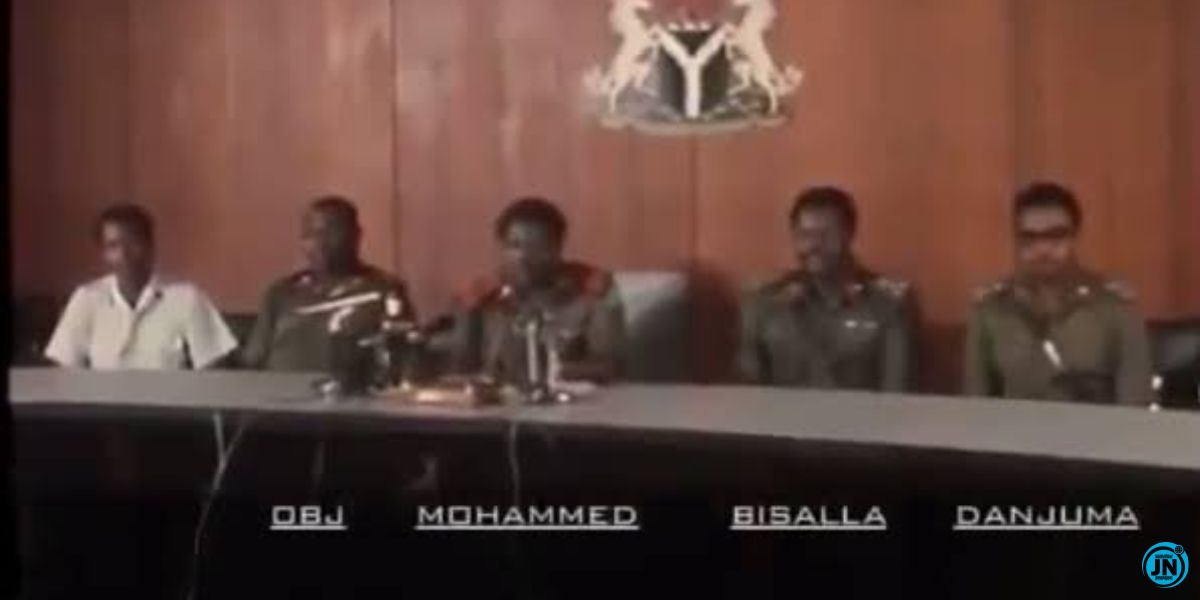
Former Military President Ibrahim Badamasi Babangida has revealed new insights into the events that transpired following the assassination of former Head of State, General Murtala Muhammed, during the failed coup attempt of February 13, 1976.
According to Babangida’s autobiography, A Journey in Service, the Supreme Military Council (SMC) convened urgently a day after the mutiny led by Lieutenant-Colonel Bukar Dimka, which resulted in the tragic death of Murtala Muhammed.
The primary agenda of this meeting was to determine a successor to lead the country. At the time, the two most senior officers in the Nigerian Army were Lieutenant-Generals Olusegun Obasanjo and Theophilus Danjuma, both of whom were considered the most suitable candidates for the position of Head of State.
Initially, deliberations within the SMC leaned towards appointing Danjuma as the next leader. However, Danjuma firmly declined the role and instead proposed that Obasanjo, who had been serving as Murtala Muhammed’s deputy, should assume the position of Head of State.
Babangida recounted that despite Danjuma’s insistence, Obasanjo was initially reluctant and even offered to retire from the Army rather than take on the leadership role. This created a moment of deadlock within the council as the officers debated the best course of action for the nation’s stability.
“The next day, the SMC met in Lagos to pick a successor to General Muhammed. We knew it would be either General Obasanjo or General Danjuma since, as Lieutenant-Generals, they were the most senior. As I recall, the pendulum swung in favour of General Danjuma at the start of the deliberations. Everyone present, including Obasanjo, thought Danjuma should take over.
“But somehow, Danjuma cast his lot with Obasanjo, insisting that as Muhammed’s deputy and a ‘senior’ Lieutenant-General, Obasanjo should succeed Murtala Muhammed. Obasanjo refused and offered, if I recall accurately, to retire from the Army to enable Danjuma to emerge as Head of State. There appeared to be a momentary stalemate. But that soon faded away. Faced with the insistence of Danjuma, everyone caved in, and Obasanjo accepted the challenge to succeed Murtala.”
Once Obasanjo accepted the leadership role and was officially confirmed as Head of State, attention turned to appointing a suitable Deputy and a Chief of Staff for the Supreme Headquarters. Babangida noted that while this decision was not formally presented before the SMC for deliberation, General Danjuma, who continued in his role as Chief of Army Staff, played a decisive role in selecting Lieutenant-Colonel Shehu Musa Yar’Adua for the position.
Yar’Adua was immediately promoted to the rank of Brigadier and later elevated to Major-General, solidifying his role in the new military administration.
Babangida also provided detailed accounts of his personal involvement in suppressing the coup attempt, including his critical role in disarming Lieutenant-Colonel Bukar Dimka and his group of mutineers at the Radio House in Lagos.
He described how, after an initial confrontation with Dimka, he had to return with reinforcements, bringing along officers such as Chris Ugokwe, Mike Otuwa, James Ojokojo, John Shagaya, and Jack Iketubosin to neutralize the coup plotters.
“Meanwhile, I returned to General Danjuma to give him a report of my encounter with Dimka. Danjuma was furious. He ordered me back to the Radio House with a reiteration of his earlier instructions to ‘flush Dimka out of place immediately.’
“I returned to Radio House with Chris Ugokwe, better equipped and prepared. By now, we had been joined by, among others, Mike Otuwa, James Ojokojo, John Shagaya, and Jack Iketubosin.
“But first, I had to reach out to my friend and classmate, Sani Sami, who commanded the Brigade of Guards, to handle a difficult assignment. The Brigade of Guards’ barracks provided easy access to the Radio House. But again, I had to be careful since I wasn’t sure whether the Brigade was still loyal to the government.
“Sani Sami and I consulted and agreed that there should be minimum destruction. And that we would do what we were taught as cadets in situations involving a civilian population to ensure that civilians got out of the way and didn’t get injured.
“Once that was done, we moved in, cordoned off the area and engaged the mutineers in a gun battle. There were casualties in the ensuing armed confrontation, including Dimka’s ADC, 2nd Lt Garba. Also, one of the other vital plotters, Major Ibrahim Rabo, was arrested by Major Yomi Williams as he tried to escape and was promptly taken to the Bonny Camp for interrogation. But, somehow, Dimka, quite inexplicably to this day, managed to escape from the scene unharmed.”
Later that evening, the government made an official announcement, confirming that the coup attempt had been successfully foiled. In honor of the late Head of State, a seven-day national mourning period was declared across the country.
On February 14, 1976, General Murtala Muhammed was laid to rest in Kano, with thousands of mourners in attendance. Among those present was Major-General Iliya Bisalla, who was later implicated in the coup plot and subsequently executed.
Babangida emphasized the widespread grief and national outrage that followed Murtala’s assassination, as protests erupted across the country, particularly in universities. Labour unions, civil society organizations, and market associations also issued statements in support of the late leader, demanding swift justice against the perpetrators of the coup attempt.
He further noted that the Nigerian military leadership, under the command of Major-General Alani Akinrinade of the 1st Division in Kaduna, immediately reaffirmed their loyalty to Murtala’s administration, ensuring that all military installations across the country distanced themselves from the coup plotters.
With Obasanjo officially assuming leadership, the military government was able to stabilize the situation and continue the transition towards the policies and governance approach initially set by Murtala Muhammed before his untimely assassination.

